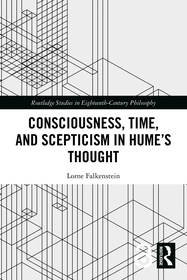
Consciousness, Time, and Scepticism in Hume’s Thought
Series: Routledge Studies in Eighteenth-Century Philosophy;
- Publisher's listprice GBP 42.99
-
20 538 Ft (19 560 Ft + 5% VAT)
The price is estimated because at the time of ordering we do not know what conversion rates will apply to HUF / product currency when the book arrives. In case HUF is weaker, the price increases slightly, in case HUF is stronger, the price goes lower slightly.
- Discount 10% (cc. 2 054 Ft off)
- Discounted price 18 484 Ft (17 604 Ft + 5% VAT)
Subcribe now and take benefit of a favourable price.
Subscribe
20 538 Ft

Availability
Estimated delivery time: In stock at the publisher, but not at Prospero's office. Delivery time approx. 3-5 weeks.
Not in stock at Prospero.
Why don't you give exact delivery time?
Delivery time is estimated on our previous experiences. We give estimations only, because we order from outside Hungary, and the delivery time mainly depends on how quickly the publisher supplies the book. Faster or slower deliveries both happen, but we do our best to supply as quickly as possible.
Product details:
- Edition number 1
- Publisher Routledge
- Date of Publication 28 September 2025
- ISBN 9781032677897
- Binding Paperback
- No. of pages338 pages
- Size 229x152 mm
- Weight 630 g
- Language English
- Illustrations 2 Illustrations, black & white; 2 Line drawings, black & white; 5 Tables, black & white 699
Categories
Short description:
David Hume’s philosophical work presents the reader with a perplexing mix of constructive accounts of empirically guided belief and destructive sceptical arguments against all belief. This book reconciles this conflict by showing that Hume intended his scepticism to be remedial.
MoreLong description:
David Hume’s philosophical work presents the reader with a perplexing mix of constructive accounts of empirically guided belief and destructive sceptical arguments against all belief. This book reconciles this conflict by showing that Hume intended his scepticism to be remedial. It immunizes us against the influence of “unphilosophical” causes of belief, determining us to proportion our beliefs to the evidence.
In making this case, this book develops Humean positions on topics Hume did not discuss in detail but that are of interest to contemporary philosophers: consciousness and the unity of consciousness, temporal experience, visual spatial perception, the experience of colour and other qualia, objective experience, and spatially extended minds. It also challenges currently accepted interpretations of Hume’s views on the finite divisibility of space and time, vacuum, the duration of unchanging objects, and identity over time. It deals with criticisms of Hume that were raised by his contemporaries, notably by Thomas Reid, draws attention to earlier seventeenth‑ and eighteenth‑century work that has bearing on the interpretation of Hume’s thought, and compares Hume’s achievements with those of later nineteenth‑century psychologists and philosophers.
Consciousness, Time, and Scepticism in Hume’s Thought will appeal to scholars and advanced students interested in Hume, history of philosophy, and early modern theories of perception, time, and consciousness.
The Introduction and Chapter 1 of this book are freely available as downloadable Open Access PDFs at http://www.taylorfrancis.com under a Creative Commons Attribution-Non Commercial-No Derivatives CC-BY-NC-ND 4.0 license.
"A carefully crafted and detailed examination of some problems in Hume’s philosophy that have not received the attention they deserve. Falkenstein has provided an exacting analysis of the various relations between time, space and the mind in Hume’s philosophy, a gift to Hume scholarship."
Wade Robison, Rochester Institute of Technology, USA
"This book is an original, deep, and unfailingly valuable interpretation and interrogation of central aspects of Hume’s epistemology, metaphysics, and philosophy of mind. It merits and rewards close study."
Don Garrett, New York University, USA
"Falkenstein’s terrific book is a study of central themes of Hume’s theoretical philosophy, with due focus on the Treatise and first Enquiry. The book displays a remarkable combination of breadth and depth. While the discussion includes a wide range of topics, such as belief, identity, space and time, the metaphysics of mind, and skepticism, Falkenstein’s consideration of each is exacting and detailed. Another virtue of the book is its rigorous and illuminating interrogations of Hume’s positions and arguments. It is a major contribution to the study of Hume’s philosophy, and every scholar of eighteenth-century metaphysics and epistemology would benefit from engaging with it."
Bridger Ehli, Indiana University Bloomington, USA
"Falkenstein discusses space, time, objectivity, consciousness, and skepticism. The attention to these deep issues of perennial philosophy and the mining of Hume’s arguments in rich historical context to find ways to address them, makes this book an important contribution to philosophy, to early modern Western scholarship, and to Hume scholarship."
Donald L. M. Baxter, University of Connecticut, USA
MoreTable of Contents:
Introduction. Hume’s remedy for unphilosophical belief 1. Impressions: colour, consciousness, temporal experience 2. Finite divisibility; manners of disposition; points 3. Time and our experience of time 4. Identity 5. The conception and perception of a vacuum 6. Belief: normativity; objects 7. Causes of the belief in bodies 8. Reasons for scepticism about the external existence of bodies Conclusion. Hume’s remedy
More



